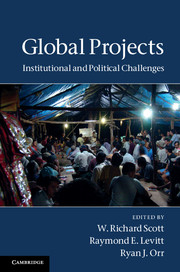Book contents
- Frontmatter
- Contents
- List of figures
- List of tables
- List of contributors
- Preface
- Introduction: studying global projects
- Part I Foundational themes
- Part II Institutional differences and global projects: empirical studies
- Part III Political conflicts and global projects
- Part IV Governance strategies and structures
- References
- Index
Introduction: studying global projects
Published online by Cambridge University Press: 05 June 2012
- Frontmatter
- Contents
- List of figures
- List of tables
- List of contributors
- Preface
- Introduction: studying global projects
- Part I Foundational themes
- Part II Institutional differences and global projects: empirical studies
- Part III Political conflicts and global projects
- Part IV Governance strategies and structures
- References
- Index
Summary
Given the fragile condition of our planet with its finite space, resources, and capabilities, we are not in favor of “development” for its own sake. Nevertheless, the likely arrival within the foreseeable future of a billion additional inhabitants on our planet will generate the need for a huge investment in basic infrastructure: water and sewage, energy production and distribution, transportation, and telecommunication, among others. At the same time, such support systems in developed countries are deteriorating and in need of renewal. Infrastructure construction projects are assuming increasing salience for both developed and developing countries. And, increasingly, those who design, fund, and build such projects are international or global in character.
Historically, the major challenges in carrying out infrastructure construction projects have been primarily technical and financial in nature, focusing on design, construction, financing, and the details of maintenance and operation. Today, many of these engineering and most of the economic problems have been solved, but the threat of social misalignments and political conflicts renders the development and management of such projects more challenging than ever before. This volume concentrates primarily on challenges confronting global projects stemming from the complexity and volatility of the political and institutional contexts within which these projects are embedded.
In this brief introduction we describe the emergence of project-based organizations, noting the origins of scholarly work on projects and the kinds of theoretical approaches currently being developed to examine these systems.
- Type
- Chapter
- Information
- Global ProjectsInstitutional and Political Challenges, pp. 1 - 12Publisher: Cambridge University PressPrint publication year: 2011
- 2
- Cited by

